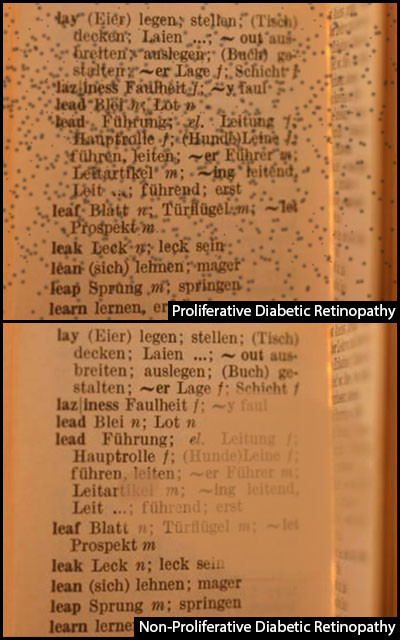The American Academy of Ophthalmology provides three important tips about preventing diabetes-related vision loss through eye exams
While the possibility of losing sight may be a common concern among seniors, eye doctors are reminding the public that advancing age is not the only reason people should be vigilant about protecting their vision. Having diabetes is another significant risk factor for developing eye diseases that can cause blindness if left untreated.
In support of the National Eye Institute’s Healthy Vision Month in May, the American Academy of Ophthalmology is urging the 29 million Americans with diabetes to become more aware that they have a greater chance  of being diagnosed with eye conditions, such as diabetic retinopathy, glaucoma and cataracts, than those without the systemic disease. Ophthalmologists – the medical doctors who treat these eye conditions – are also emphasizing that in addition to maintaining good blood glucose levels, having a dilated eye exam is the best first-line defense against vision loss from diabetic eye disease.
of being diagnosed with eye conditions, such as diabetic retinopathy, glaucoma and cataracts, than those without the systemic disease. Ophthalmologists – the medical doctors who treat these eye conditions – are also emphasizing that in addition to maintaining good blood glucose levels, having a dilated eye exam is the best first-line defense against vision loss from diabetic eye disease.
To help people with diabetes protect their sight, the Academy is sharing with the public three important tips about preventing and detecting diabetic eye disease through eye exams.
“It’s very important for all people with diabetes to know that diabetes can affect their eyes,” said ophthalmologist Purnima S. Patel, M.D. “Diabetes causes damage throughout the body by affecting small blood vessels, and some of the smallest blood vessels are in the back of the eye. This can result in bleeding or leakage of fluid that can result in decreased vision or even blindness. This is known as diabetic retinopathy, but if it’s detected early we can control it and prevent vision loss.”
“The diabetic retinopathy exam is a comprehensive eye exam that includes a dilated retinal exam with special microscopes and lenses,” said retinal specialist Abdhish R. Bhavsar, M.D. “The retina at the back of the eye is like the film in a camera and it makes the picture and sends the signal to the brain. With specialized instruments in the office, the ophthalmologist can see the retina in great detail in order to assess the potential changes that diabetic retinopathy causes.”
“It is recommended that adults with type 2 diabetes have a comprehensive eye exam with dilation when they are diagnosed, then at yearly intervals,” said ophthalmologist Gary Hirshfield, M.D. “People with type 1 diabetes require a dilated eye exam five years after diagnosis, and annually after that.
These tips are related to questions submitted by the public through the Academy’s Ask an Eye M.D. portal on its public education website, EyeSmart. For more important tips to preventing diabetes-related vision loss, visit: www.aao.org/eye-health/tips-prevention/top-five-diabetes-steps.
Seniors who are worried about diabetic eye disease risk and who have not had an eye exam in the last three years may qualify for EyeCare America, a public service program of the Foundation of the American Academy of Ophthalmology. EyeCare America provides eye exams and care at no out-of-pocket cost for eligible seniors age 65 and older through its network of more than 6,000 volunteer ophthalmologists. Visit www.eyecareamerica.org to see if you or your loved ones are eligible.
About the American Academy of Ophthalmology
The American Academy of Ophthalmology, headquartered in San Francisco, is the world's largest association of eye physicians and surgeons, serving more than 32,000 members worldwide. The Academy's mission is to advance the lifelong learning and professional interests of ophthalmologists to ensure that the public can obtain the best possible eye care. For more information, visit www.aao.org.
The Academy is also a leading provider of eye care information to the public. The Academy's EyeSmart® program educates the public about the importance of eye health and empowers them to preserve healthy vision. EyeSmart provides the most trusted and medically accurate information about eye diseases, conditions and injuries. OjosSanos™ is the Spanish-language version of the program. Visit EyeSmart or OjosSanos to learn more.
About EyeCare America
Established in 1985, EyeCare America, a public service program of the Foundation of the American Academy of Ophthalmology, is committed to the preservation of sight, accomplishing its mission through public service and education. EyeCare America provides year-round eye care services to medically underserved seniors and those at increased risk for eye disease. More than 90 percent of the care made available is provided at no out-of-pocket cost to the patients. EyeCare America is co-sponsored by the Knights Templar Eye Foundation Inc., with additional support provided by Alcon and Genentech. More information can be found at www.eyecareamerica.org.